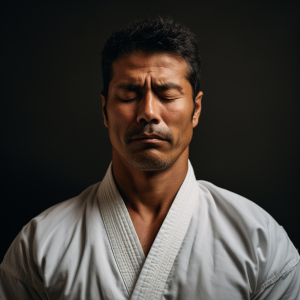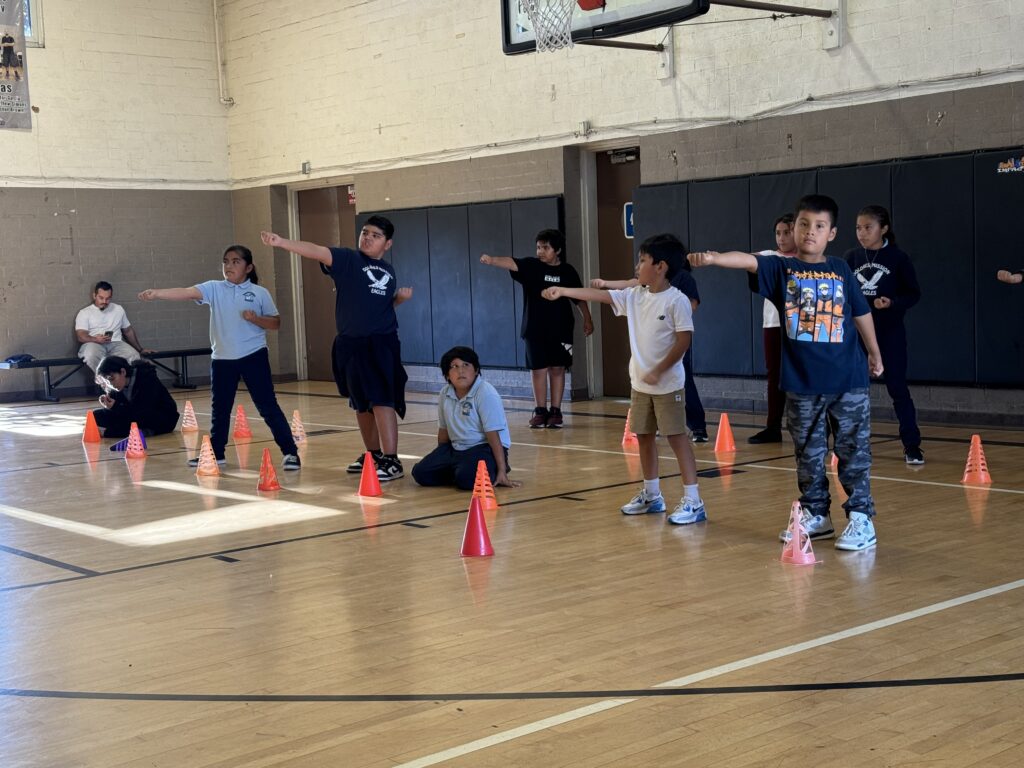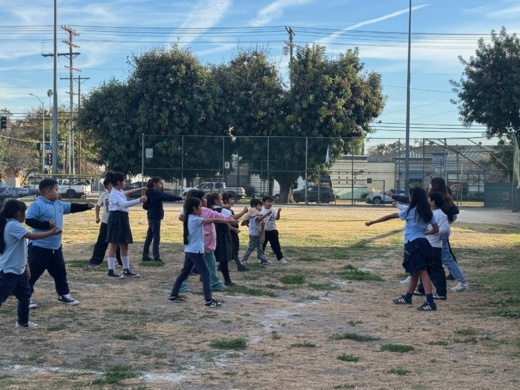 In the relentless rhythm of our daily lives, where stress echoes through every responsibility, self-doubt casts shadows on confidence, and emotions teeter on the edge of breaking, there exists a source of relief—one where the discipline of the mind partnered with physical fitness training converges to unlock the secrets of emotional well-being. Welcome to part two of our exploration into the symbiotic relationship between martial arts and mental health.
In the relentless rhythm of our daily lives, where stress echoes through every responsibility, self-doubt casts shadows on confidence, and emotions teeter on the edge of breaking, there exists a source of relief—one where the discipline of the mind partnered with physical fitness training converges to unlock the secrets of emotional well-being. Welcome to part two of our exploration into the symbiotic relationship between martial arts and mental health.
Within the space of martial arts training, stress can transform from an overwhelming force into a manageable energy that can be directed at will. As the body engages in the physical aspects of martial arts, the mind is liberated from the stresses of everyday life and focused on the moment at hand. It is here that the transformative power of martial arts in stress management reveals itself—a formidable partnership between physical exertion and stress release.
Even better, this positive impact extends beyond stress relief. Through the challenges of perfecting techniques, overcoming personal limits, and engaging in consistent, comprehensive physical fitness, practitioners emerge not only physically empowered but mentally fortified. The incremental progress that comes within our step-by-step platform creates a realization of one’s own capabilities, building a strong foundation for a robust sense of self. Confidence transforms into an unwavering strength that guides practitioners not only through the intricacies of martial arts but also through the labyrinth of life’s challenges.
Finally, emotional regulation emerges as a cornerstone of martial arts practice. The controlled environment of martial arts becomes a testing ground for managing emotions under pressure. In the heat of an intense practice session or during the precision of a complex form, practitioners learn to navigate the ebb and flow of emotions that accompany it. This emotional intelligence becomes a valuable asset, fostering resilience and composure in the face of life’s complexities.
Let’s continue to explore how to achieve a healthy mental well-being through martial arts where stress management, building confidence and self-esteem, and encouraging emotional regulation and control is learned and regularly practiced.
Stress Management – Finding Calm in the Storm
“Given that martial arts require expenditure of energy done with a high level of concentration, engagement in this form of exercise may provide an interesting and novel strategy for enhancing physical and mental (health).”
European Journal of Human Movement, 2015
As unfortunate as it may be, stress has become an omnipresent force in our lives, a relentless adversary that can compromise both physical and mental well-being. Within the realm of martial arts, however, stress transforms from an overwhelming antagonist into a formidable but manageable energy that each practitioner can learn to direct.
According to Dr. Dan Brennan from WebMD (2021), martial arts help train your mind to keep your attention focused while remaining calm and alert. This can be especially helpful when you’re trying to do multiple tasks that divide your attention. Picture a martial arts student practicing – they must focus on their micro-movements, as insignificant as they may seem, piece by piece to tie them together as a form/technique. This focus, learned through training, is a valuable skill for both inside and outside the dojo.
 In addition, it is equally important to mention the skill of learning to “tune out” incessant noise. This could be anything from environmental distractions to internal battles we’re facing that are causing us concern. Not only does this elevate the training process, but it inevitably filters into our personal lives, providing a way to multi-task, prioritize, and only focus on the issues at hand.
In addition, it is equally important to mention the skill of learning to “tune out” incessant noise. This could be anything from environmental distractions to internal battles we’re facing that are causing us concern. Not only does this elevate the training process, but it inevitably filters into our personal lives, providing a way to multi-task, prioritize, and only focus on the issues at hand.
The physical exertion involved in martial arts is also a powerful antidote to the manifestations of stress, like irritability, tension (headaches, cramps, etc.), and other health concerns. The intensity of a training session allows the body to release pent-up tension, promoting the production of endorphins — the body’s natural stress relievers.
The repetitive nature of practicing techniques not only refines martial arts skills but also serves as a therapeutic outlet, enabling practitioners to channel stress into controlled and purposeful movements. It’s a cathartic release, where the body and mind collaborate to transform stress from a burden into a source of empowerment.
The mental fortitude developed during martial arts training plays a pivotal role in stress management. The challenges that a typical student faces — be it mastering complex techniques and/or pushing past extensive physical exertion — build resilience. The mindset cultivated as a martial arts student becomes a tool to confront stressors outside its training. Practitioners learn to approach stress with a composed and strategic outlook, viewing challenges as opportunities for growth rather than insurmountable obstacles.
In the journey of stress management through martial arts, learning techniques and movements become more than just a simple physical education lesson; it becomes a refuge. It is a space where the relentless badgering of stress is transformed into a controlled cadence, where practitioners learn not only to endure the storm but to find calm within it.
Empowerment Through Confidence/Self-Esteem
Within the realm of martial arts, confidence is not merely a character trait; it is an evolutionary process filled with dynamic self-discovery and empowerment. The journey from novice student to adept student in martial arts is a testament to the transformative impact it can have on one’s confidence and self-esteem.
Because martial arts naturally instill a sense of discipline and determination, it is an effective solution to those seeking improved self-assurance/confidence. The structured nature of training and the emphasis on resolute, continuous improvement contribute to a mindset that applies to life outside of training. Practitioners learn to believe that with concentrated effort and perseverance, they can overcome obstacles and achieve their goals—a mindset that naturally spills over into their personal environment.
The path to becoming a skilled martial artist is paved with challenges that extend beyond the physical parts of training. It requires navigating the intricacies of a technique, understanding the movements/purpose behind the technique, and confronting potential personal limitations. As students move through the program, the ability to overcome these challenges becomes a source of self-assurance and confidence (Brennan, 2021). The incremental victories that come with perfecting a new form or executing a technique with precision become profound milestones in a journey towards self-discovery and confidence.
The physical aspect of martial arts also plays a role in reshaping self-perception. The body undergoes a comprehensive transformation as students build strength, flexibility, and agility. This physical empowerment translates into a positive self-image, fostering a healthier relationship with one’s overall self-esteem.
In the realm of martial arts, confidence and self-esteem are not just byproducts; they are fundamental elements. The journey of self-discovery and empowerment becomes a recipe for navigating life with assurance and resilience, where every refined technique or movement becomes a steppingstone toward a more confident and self-assured self.
Fortifying Emotional Resilience and Self-Control
Finally, the ability to maintain one’s emotions and utilize self-control is an invaluable lesson inherent within martial arts. Whether it’s the adrenaline surge that might be felt during practice or the frustration of struggling with a challenging technique, students learn to recognize and harness their emotions rather than be controlled by them. This heightened emotional intelligence contributes to the development of resilience—a quality that allows individuals to bounce back from setbacks, adapt to changing circumstances, and maintain composure in the face of adversity.
“Overall, martial arts training can be a rewarding and enriching experience that helps individuals develop both physical and mental resilience.”
Daniel Gluche, 2022
 Martial artists are trained to regulate their responses to various stimuli: from a practice session filled with distractions to an internal battle of worry and concern, they learn the art of deliberate and focused attention. It becomes a mental discipline—an internal dialogue that guides practitioners to stay centered, composed, and strategic even in challenging situations.
Martial artists are trained to regulate their responses to various stimuli: from a practice session filled with distractions to an internal battle of worry and concern, they learn the art of deliberate and focused attention. It becomes a mental discipline—an internal dialogue that guides practitioners to stay centered, composed, and strategic even in challenging situations.
The emphasis on respect and courtesy within the martial arts community also contributes to the development of emotional resilience and self-control. Practitioners learn to manage conflicts with a composed demeanor, understanding that aggression and impulsivity have no place within the philosophy of martial arts. This translates into a broader life skill, where individuals learn to manage interpersonal relationships, diffuse tension, and maintain a sense of balance even in emotionally charged situations.
Overall, the pursuit of emotional resilience and self-control in martial arts is not just about mastering techniques/movements; it’s about mastering the self. Physical training becomes a breeding ground for emotional training, where students learn to understand and refine their emotional responses. As they nurture and elevate these qualities, they emerge not only as skilled martial artists but as individuals capable of navigating life’s complexities with a calm demeanor, fortitude, and unwavering self-control.
“(These studies) suggested that, in general, martial arts were able to positively influence both stress management and mindfulness levels as well as to influence health related parameters. Apart from this, martial arts have been demonstrated to be more effective when compared to others forms of physical activity and leisure. (They have) resulted in greater improvements for mindfulness levels and for stress management than (other) recreational activities.”
(European Journal of Human Movement, 2015).
Martial arts training creates an environment where the cacophony of external stressors gradually fades away through learning the art of discipline, focus, and self-control. Mastering these character traits provides an extensive toolbox where students can decrease stress, elevate their confidence and self-esteem, and strengthen their emotional resilience.
In the final piece of our three-part series on improving mental health through martial arts, we’ll cover how to maintain the lessons learned throughout your martial arts training and suggest tips/tricks to seamlessly integrate it into your daily routines.
References
Brennan, D. (2021). Mental Benefits of Martial Arts. WebMD. Retrieved from https://www.webmd.com/mental-health/mental-benefits-of-martial-arts
Gluche, D. (2022). Martial Arts Training Can Be an Excellent Way to Improve Your Resilience and Overall Well-Being. Retrieved from https://medium.com/@daniel_stories/martial-arts-training-can-be-an-excellent-way-to-improve-your-resilience-and-overall-well-being-51737c6eb60
Naves-Bittencourt, Wesley & Sousa, Arilson & Stults-Kolehmainen, Matthew & Fontes, Eduardo & Córdova, Claudio & Demarzo, Marcelo & Boullosa, Daniel. (2015). Martial arts: mindful exercise to combat stress. European Journal of Human Movement.






